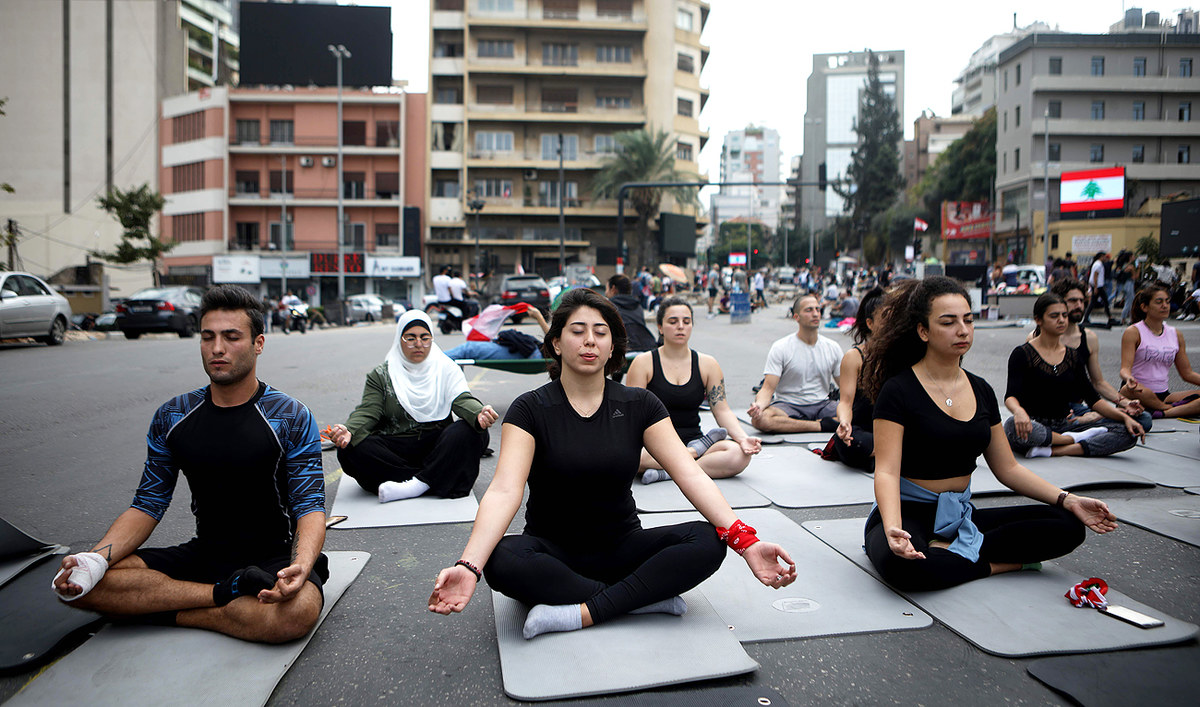BEIRUT: Protests in Lebanon entered their 12th day as security forces clashed with demonstrators blocking main roads in Beirut and routes connecting the capital to other regions.
There were flashpoints across the city as authorities attempted to reopen key highways shut off by protesters in a bid to maintain pressure for political change.
Groups of activists marched on the central bank and branches across Lebanon calling for the resignation of its governor, Riad Salameh, who they hold responsible for the country’s financial woes.
The Lebanese banking association decided on Monday to stick with its decision to keep banks shut on Tuesday, marking the longest period of bank closures in the country’s financial history.
However, following an exceptional meeting, the association stressed its commitment to “pay out salaries for public sector workers, including security forces,” adding that the central bank was “working to secure necessary liquidity for this purpose.”
A group of lawyers, sympathetic to the protesters, staged a sit-in outside the Justice Palace in Beirut. MPs from the parliamentary bloc loyal to President Michel Aoun announced lifting bank secrecy on their accounts.
Protesters have accused head of bloc and foreign minister, Gebran Bassil, of corruption and are demanding he stand down along with others.
Member of the Labanese Parliament, Eddy Maalouf, said: “The decision to lift bank secrecy will include ministers and MPs and the two female deputies of the head of the Free Patriotic Movement, by signing documents at the notary’s office, to lift bank secrecy on their accounts in Lebanon and abroad.
“This step marks the beginning of initiatives by the Free Patriotic Movement to reach the adoption of anti-corruption laws, to ensure the accountability of corrupt officials and unveil the truth before the people, instead of the prevailing wave of disinformation, slander and lies.”
In an attempt by the authority to prove its seriousness in the implementation of the reform package it had announced earlier, Lebanon’s Prime Minister Saad Hariri on Monday presided over a meeting of the ministerial council to study the draft general amnesty law.
Following a meeting with Parliament Speaker Nabih Berri, a delegation from the Aounist parliamentary bloc reiterated “the need to adopt legislative proposals it had previously presented, related to anti-corruption, accountability and recovery of looted wealth.”
The bloc’s secretary-general, MP Ibrahim Kanaan, said that Berri would “activate the work and ask the parliamentary committees to start studying all proposals and the 2020 draft budget, without any delay.”
Afifa Al-Sayed, veteran activist from the civil society, told Arab News: “The young men and women in the streets are tired, especially as they have not received any prompt response to their demands and that their movement is not organized.
“Security bodies on Monday opened the roads by force, in Sidon in particular. Protesters in the streets are starting to feel that the situation is cooling down. If we give up and leave the streets, they will work on further breaking us.
“This is the revolution and the cause of the youth, and they cannot be told what to do. They are even refusing to be told what to do next. If things stay this way, they might lead to chaos and this might be advantageous since it will make the authority feel uncertain,” she added.
“Meanwhile, some groups are building strategies and ideas for the revolution and are trying to contact other groups protesting on the ground to suggest names that can be trusted to speak in their names. But until then, it is the revolution of the youth, and they decide what they want.”

Lebanese anti-government protesters practice yoga on a blocked avenue in the center of the capital Beirut. (AFP)
Another activist, Randa Al-Yaseer, told Arab News: “More meetings are being organized to find new ways to protest, especially that people are starting to feel tired, therefore, protests in the streets might be transformed to other activities.
“If I tell protesters something they do not like, they ask me to leave. They say even their parents cannot tell them what do. Some groups are communicating on social media outlets and refuse to reveal their identities. That is their right, since there are fears of getting arrested by the authority and security bodies, which can mean the end of the protests.
“Even the protest squares are being attacked. Some people come at night and steal the chairs and tables we bought with our own money. Some women have been offering water bottles and sandwiches to people in the streets, to discover later that some people were selling the bottles and sandwiches for one dollar,” added Al-Yaseer.
“We cannot say that the movement is failing. People are surprising us. They are showing motivation, but only in the afternoon and at night.”




























